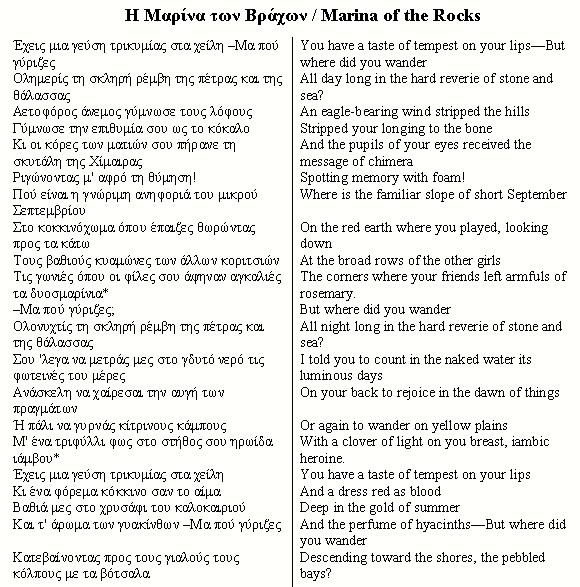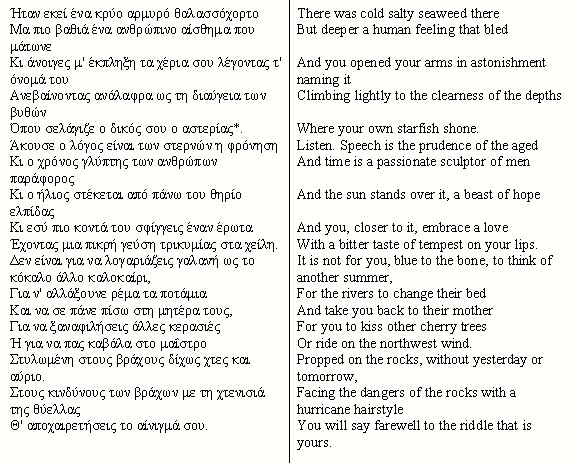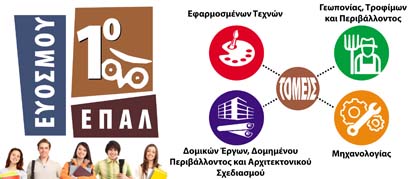Bibliorestaurant, Poetry to take away
«Η Μαρίνα των Βράχων», Οδυσσέας Ελύτης
Συλλογή «Προσανατολισμοί»
Τον μήνα Νοέμβριο, στο πλαίσιο της ενότητας «Bibliorestaurant. Poetry to take away» οι μαθητές της ομάδας Erasmus + KA2 συγκεντρώθηκαν στο χώρο της βιβλιοθήκης του 1ου ΕΠΑΛ ΕΥΟΣΜΟΥ. Εκεί συζήτησαν και εργάστηκαν με βάση το ποίημα του Οδυσσέα Ελύτη, «Η Μαρίνα των βράχων». Η παιδαγωγική ομάδα των καθηγητών και οι μαθητές του προγράμματος Erasmus + (Carpe Librum: The school library and the communication skills through the study of literary and cultural relations between Greece and Spain) θεωρούν πως η λογοτεχνία αποτελεί ένα μάθημα κατά τη διάρκεια του οποίου οι μαθητές βιώνουν και εξωτερικεύουν συναισθήματα!

Εικόνα 1. Η Μαρίνα των βράχων, Οδ. Ελύτης
Ο Οδυσσέας Ελύτης (1911-1996) γεννήθηκε στο Ηράκλειο. Κατάγεται από την Λέσβο. Σπούδασε νομικά στο πανεπιστήμιο Αθηνών. Στα Ελληνικά γράμματα εμφανίστηκε το 1935. Επηρεάστηκε από το λογοτεχνικό ρεύμα κυρίως του υπερρεαλισμού. Πολλά ποιήματά του μελοποιήθηκαν, ενώ συλλογές του έχουν μεταφραστεί σε πολλές ξένες γλώσσες. Θεωρείται ως ένας από τους σημαντικότερους νεοέλληνες ποιητές. Το 1979 τιμήθηκε με το βραβείο Νόμπελ της λογοτεχνίας.
Ο Οδυσσέας Ελύτης ταξίδεψε στην Ισπανία 2 φορές. Την πρώτη, το 1950 για τουριστικούς λόγους. Τη δεύτερη, το 1980 όπου κηρύσσεται επίτιμος πολίτης του Toledo. Ο ίδιος ο Ελύτης είχε άλλωστε δηλώσει πως είχε διαβάσει Ισπανούς ποιητές αναφερόμενος στους: Lorca, Salinas, Altolaguirre, Alberti και Aleixandre. Ο Οδυσσέας Ελύτης μεταφράστηκε στα Ισπανικά μετά το 1979.

Εικόνα 2. Οδυσσέας Ελύτης


ΣΧΟΛΙΑ ΜΑΘΗΤΩΝ:
Χαρακτηριστικός ήτανε ο σχολιασμός των μαθητών σχετικά με το ποίημα. Παραθέτουμε κάποια από τα σχόλια αυτά.
«Πλήθος εικόνων που αναδεικνύουν το αιγαιοπελαγίτικο τοπίο»
«Η εικόνα της έφηβης Μαρίνας, ιδιαίτερα μυστηριώδης»
«Η Μαρίνα ζει την αθώα περίοδο της εφηβείας. Ο ποιητής τη συμβουλεύει να ατενίζει με αισιοδοξία το μέλλον»
«Με την ανακάλυψη του έρωτα η ηρωϊδα ενηλικιώνεται, χάνει οριστικά την αθωότητά της. Οι συμβουλές του ποιητή γίνονται πιο ρεαλιστικές»
«Συγκλονιστική η πέτρινη, απολιθωμένη μορφή της Μαρίνας στο τέλος του ποιήματος!»
«Ο ενήλικος Ελύτης συμβουλεύει τη Μαρίνα. Η ίδια δεν αντιλαμβάνεται την ομορφιά της ηλικίας της. Με την ενηλικίωσή της, η μαγεία της εφηβείας χάνεται και η ίδια θα αντιμετωπίζει τις δυσκολίες της ζωής»
Bibliorestaurant
Poetry to take away
"The Marina of the Rocks", Odysseas Elytis
Collection "Orientation"
In November, under the section "Bibliorestaurant. Poetry to take away » the students of the Erasmus + KA2 group gathered in the library of the 1st EPAL EVOSMOU. They discussed and worked on the poem of Odysseus Elytis, "The Marina of the Rocks". The teachers' pedagogical team and Erasmus + students (Carpe Librum: The School Library and the Communication Skills through the Study of Literary and Cultural Relations between Greece and Spain) consider that literature is a lesson during which students experience and externalize feelings!
Marina of the Rocks, Odysseus Elytis
Odysseas Elytis (1911-1996) was born in Heraklion. He comes from Lesvos. He studied Law at the University of Athens. In Greek letters he appeared in 1935. He was influenced by the literary, especially the surrealism. Many of his poems have been melodic, while his collections have been translated into many foreign languages. He is considered one of the most important New Greek poets. In 1979 he was awarded with the Nobel Prize in Literature.
Odysseus Elytis visited Spain two times. The first one, in 1950 for tourist purposes. The second one, in 1980, where he was declared an honorary citizen of Toledo. Elytis himself had stated that he had read Spanish poets referring to Lorca, Salinas, Altolaguirre, Alberti and Aleixandre. His poems were translated into Spanish after 1979.

Odysseus Elytis

STUDENTS ' COMMENTS:
Characteristic was the student's commentary on the poem. Below, are some of these comments.
"Numerous images that highlight the Aegean nature"
"The image of the teenage Marina, especially mysterious"
"Marina lives in the innocent period of puberty. The poet advises her to look at the optimism of the future "
"With the discovery of love, the heroine grows old, losing her innocence. The poem’s advice becomes more realistic "
"Stunning the stone, the fossilized form of Marina at the end of the poem!"
"Adult Elytis advises Marina. She does not understand the beauty of her age. With her adulthood, teenage magic will be lost and herself will face the difficulties of life "



